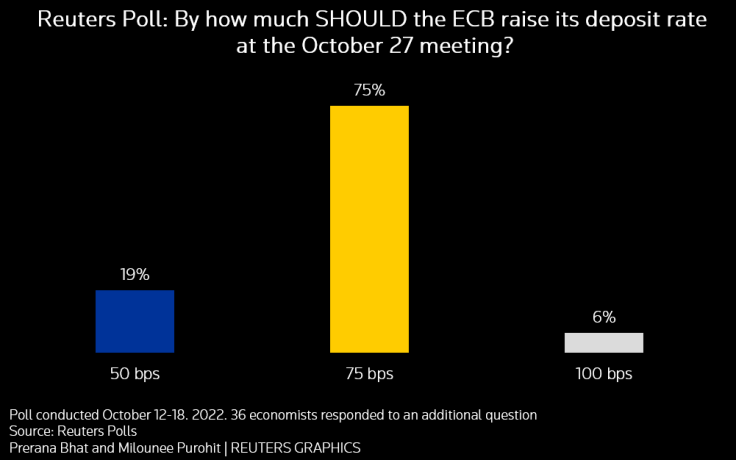ECB To Go Big Again On Oct. 27 With 75 Bps Rate Hike: Reuters Poll

The European Central Bank will go for another jumbo 75 basis point increase to its deposit and refinancing rates when it meets on Oct. 27 as it tries to contain inflation running at five times its target, a Reuters poll found.
As in much of the world, euro zone inflation has soared on skyrocketing energy prices and supply chains still healing from the coronavirus pandemic have taken a further hit from Russia's invasion of Ukraine.
The ECB targets inflation at 2.0%, yet it was 10.0% last month. It will average at a peak of 9.6% this quarter, higher than thought last month, before gradually drifting down but will not reach target until late 2024, the poll found.
"Inflation is far too high. Rapid rate rises are needed. However, the ECB also needs to keep an eye on bond spreads, so more than 75bps seems unlikely," said Brian Martin at ANZ.
Much of the price pressure is coming from energy costs. With no end in sight to the Russia-Ukraine conflict, nearly 65% of 34 respondents said the cost of living in the euro zone would worsen or worsen significantly. Only 12 said it would improve.
"The worst impact of the energy crisis on the household sector will develop in Q4 2022 and Q1 2023, when the demand for gas is seasonally higher," said Luca Mezzomo at Intesa Sanpaolo. (Graphic: Reuters Poll - Euro zone economic outlook,

)
In the run-up to winter, forecasters are expecting the ECB to be more aggressive in tightening policy.
The bloc's central bank will take the deposit rate to 1.50% and the refinancing rate to 2.00% next Thursday, a view held by an overwhelming majority of respondents in the Oct. 12-18 Reuters poll of more than 60 economists.
Three-quarters of respondents to an additional question, 27 of 36, said the bank ought to choose a 75 basis point lift to the deposit rate while two said it should go harder with a 100 basis point increase. Only seven recommended 50 basis points. (Graphic: Reuters Poll - ECB monetary policy outlook,

)
SHORT AND SHALLOW?
The ECB's first increase did not come until July, when it added 50 basis points to all its rates - taking the deposit rate to zero, its first time not in negative territory since 2014 - and followed that up with a 75 basis point lift in September.
That was slow compared to peers like the United States Federal Reserve, which has contributed to a fall in the euro to below parity to the U.S. dollar.
By year-end the deposit and refinancing rates were forecast to be at 2.00% and 2.50% respectively compared to 1.25% and 2.00% predicted in a September poll.
The deposit rate was expected to reach a peak of 2.50% next year and the refinancing rate 3.00%, higher than the 1.50% and 2.00% highs given in September. The highest forecast was for them to reach 4.00% and 4.50%.
The ECB has promised more hikes and begun a debate about unwinding its 3.3 trillion euros ($3.25 trillion) of bond purchases - the legacy of its fight against deflation in the last decade.
Two hawks on the ECB's Governing Council called last week for more hikes to fight runaway price rises. But the central bank is also facing a recession in the bloc and economists in the poll gave a median chance of 70% of one within a year.
Asked what type of recession it would be, 22 of 46 respondents said it would be short and shallow while 15 said it would be long and shallow. Eight said it would be short and deep and only one said it would be long and deep.
The economy was expected to grow 3.0% this year but flatline in 2023 before returning to growth in 2024 and expanding 1.5%. In September's poll those forecasts were 2.9%, 0.4% and 1.6%.
(For other stories from the Reuters global economic poll:)
($1 = 1.0144 euros)
© Copyright Thomson Reuters 2024. All rights reserved.




















